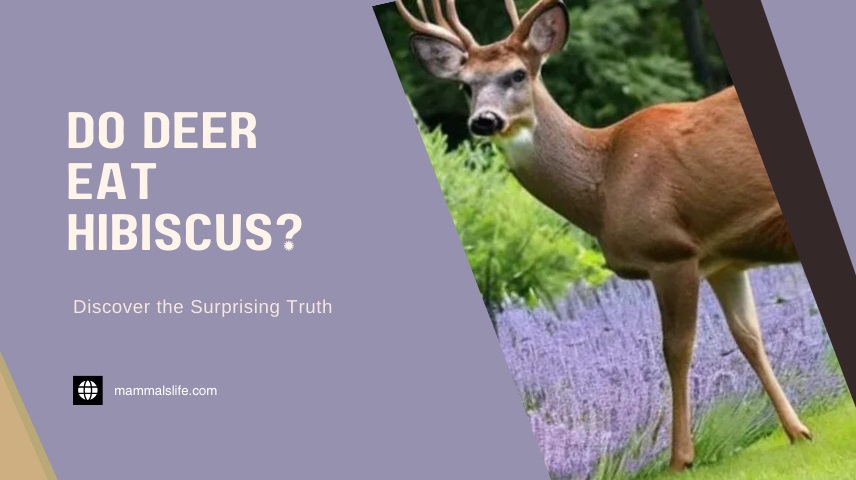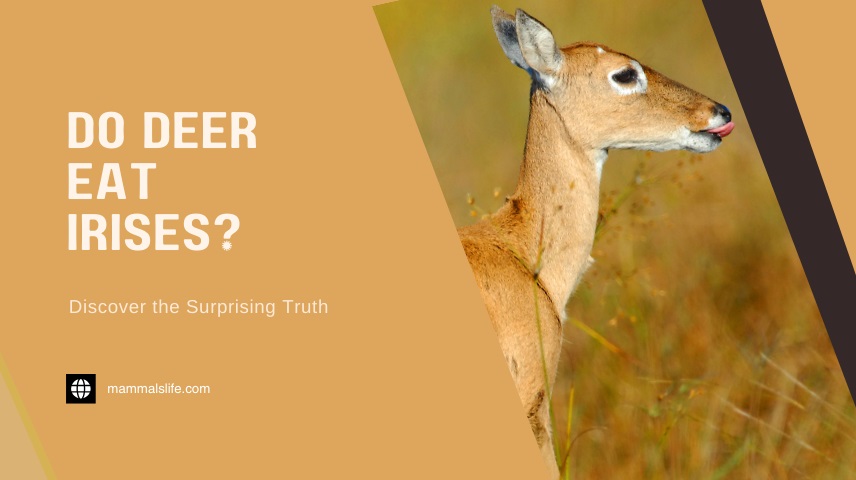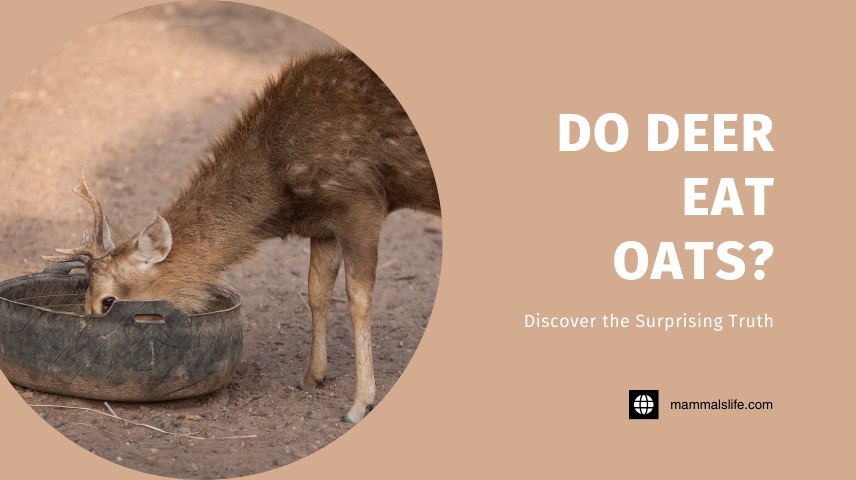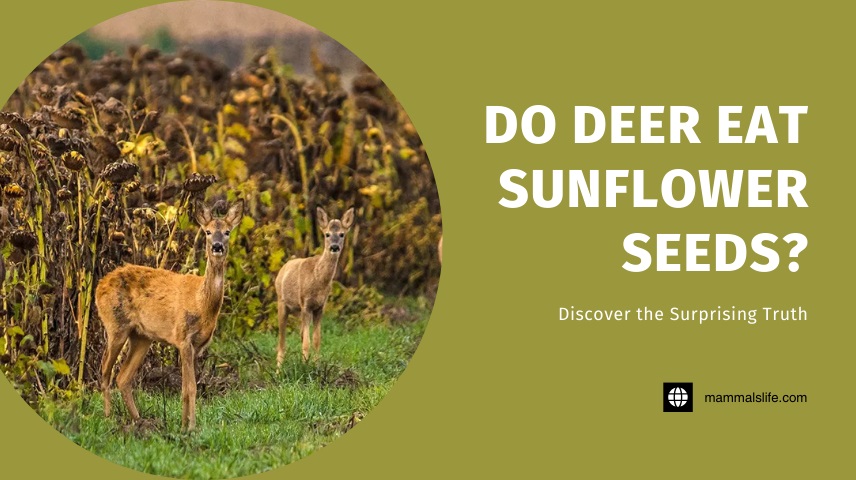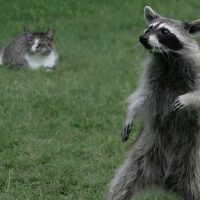Last Updated on February 22, 2025 by Mammals Life
Yes, deer eat hibiscus. They find the plant’s leaves and flowers quite appetizing.
Hibiscus plants are a popular choice for many gardeners due to their vibrant blooms and lush foliage. Unfortunately, these attractive plants often fall victim to hungry deer. Deer have a broad diet and hibiscus plants are not exempt from their grazing habits.
This can be frustrating for gardeners who take pride in their well-tended landscapes. Protecting your hibiscus plants from deer might require some strategic planning. Understanding why deer are drawn to these plants can help in devising effective deterrents. By taking proactive measures, you can enjoy the beauty of hibiscus without the worry of deer damage.
Deer Diet Basics
Deer are graceful creatures that roam forests, fields, and gardens. Understanding what they eat helps manage their impact on your garden. Their diet varies by season and region.
Common Foods
Deer enjoy a variety of foods available in their habitat. Here are some common items in their diet:
- Grasses
- Leaves
- Fruits
- Acorns
- Twigs
They also consume crops, flowers, and even tree bark. This variety helps them survive in different environments.
Nutritional Needs
Deer need a balanced diet to stay healthy. Their diet must include:
- Proteins: Essential for growth and muscle development.
- Carbohydrates: Provide energy for daily activities.
- Fats: Important for storing energy.
- Vitamins and Minerals: Crucial for overall health and reproduction.
Each food type offers specific benefits. For example, grasses and leaves supply fiber, while fruits provide vitamins.
Check out the table below for a quick overview:
| Food Type | Nutritional Benefit |
|---|---|
| Grasses | Fiber, Carbohydrates |
| Leaves | Fiber, Vitamins |
| Fruits | Vitamins, Sugars |
| Acorns | Fats, Proteins |
| Twigs | Fiber, Minerals |
Understanding deer nutritional needs helps explain their food choices. This knowledge is key to managing their impact on your garden and property.
Hibiscus Plant Characteristics
The hibiscus plant is known for its large, colorful flowers. These flowers attract butterflies and hummingbirds. The plant can grow as a shrub or a small tree. Hibiscus plants are popular in gardens due to their beauty.
Types Of Hibiscus
There are many types of hibiscus plants. Here are some common ones:
- Hibiscus rosa-sinensis: Also known as the Chinese hibiscus, this type has large, bright flowers.
- Hibiscus moscheutos: Known as the swamp rose mallow, it prefers wet conditions.
- Hibiscus syriacus: Also called the Rose of Sharon, it blooms late in the summer.
Growth Conditions
Hibiscus plants need specific conditions to thrive. Here are the key factors:
| Condition | Requirement |
|---|---|
| Sunlight | Full sun to partial shade |
| Soil | Well-draining, fertile soil |
| Water | Moderate, with more in hot weather |
| Temperature | Warm climates, above 60°F |
Proper care ensures hibiscus plants stay healthy. They reward gardeners with beautiful blooms.
Deer And Hibiscus Interaction
Hibiscus plants are known for their beautiful flowers. Deer are often seen in gardens and forests. Many people wonder if deer eat hibiscus. Understanding this interaction can help gardeners protect their plants.
Observations In The Wild
Observations show that deer do eat hibiscus. In the wild, deer eat many types of plants. Hibiscus is one of them. Deer find hibiscus leaves and flowers tasty. They can eat an entire plant in one visit.
Wild deer are always looking for food. They eat leaves, flowers, and even bark. Hibiscus plants are not safe from them. Many people have seen deer eating hibiscus in forests and parks.
Garden Reports
Gardeners report deer eating hibiscus plants. This happens often in areas with many deer. Gardeners see their hibiscus plants damaged or eaten. Deer come into gardens and munch on the plants.
Here are some common signs that deer have been in your garden:
- Missing flowers and leaves
- Damaged stems
- Deer tracks around the plants
Some gardeners use fences to keep deer away. Others use sprays or other methods. Protecting hibiscus from deer is a common concern.
Here is a quick summary in a table:
| Deer Activity | Impact on Hibiscus |
|---|---|
| Eating leaves | Leaves are missing |
| Eating flowers | Flowers are gone |
| Damaging stems | Stems are broken |
Understanding the interaction between deer and hibiscus helps protect gardens. Knowing what to look for can save your plants.
Protecting Your Hibiscus
Deer love to nibble on hibiscus plants, which can be frustrating for gardeners. Protecting your hibiscus is essential to keep these beautiful plants safe and thriving. Here are some effective ways to prevent deer from eating your hibiscus.
Fencing Options
Fencing is one of the most reliable ways to protect your hibiscus from deer. A fence should be at least 8 feet tall because deer can jump very high. You can use different materials like wood, wire, or plastic to build your fence.
Consider installing an electric fence for added security. An electric fence gives a mild shock, which deters deer without harming them. Make sure to check local regulations before installing an electric fence.
| Material | Pros | Cons |
|---|---|---|
| Wood | Sturdy, long-lasting | Expensive, requires maintenance |
| Wire | Affordable, easy to install | Less aesthetic, can rust |
| Plastic | Cheap, weather-resistant | Less durable, can break |
Natural Deterrents
Natural deterrents can also help keep deer away from your hibiscus. Planting certain herbs and flowers can act as a natural barrier. Deer dislike plants like lavender, rosemary, and marigold. Plant these around your hibiscus to create a protective border.
Another effective method is using deer repellents. You can make your own repellent using ingredients like eggs, garlic, and pepper. These ingredients create a strong smell that deer find unpleasant. Spray the mixture around your hibiscus for best results.
- Lavender: Pleasant scent for humans, but deer hate it.
- Rosemary: Strong smell that deters deer.
- Marigold: Bright flowers that deer avoid.
Alternative Deer-resistant Plants
Deer love to munch on hibiscus, which can be frustrating for gardeners. To protect your garden, consider planting alternative deer-resistant plants. These plants are less appetizing to deer and can keep your garden beautiful.
Flower Choices
Choosing the right flowers is key to a deer-resistant garden. Here are some options:
- Lavender: Its strong scent deters deer.
- Marigolds: Deer dislike their pungent odor.
- Foxglove: Toxic to deer and they avoid it.
- Peonies: Deer find these too bitter to eat.
- Snapdragons: Not preferred by deer due to their texture.
Shrub Options
Shrubs add structure to your garden while keeping deer at bay. Here are some suggestions:
| Shrub | Reason Deer Avoid |
|---|---|
| Boxwood | Strong scent and bitter taste |
| Butterfly Bush | Leaves are toxic to deer |
| Juniper | Prickly texture |
| Spirea | Not palatable to deer |
| Holly | Spiny leaves deter deer |
Frequently Asked Questions
Do Deer Eat Hibiscus Flowers?
Yes, deer are attracted to the flowers and leaves of hibiscus plants.
How To Protect Hibiscus From Deer?
Use deer repellents, fencing, or plant deer-resistant plants around hibiscus to keep them safe.
Are Hibiscus Plants Deer-resistant?
No, hibiscus plants are not deer-resistant and are often eaten by deer.
What Attracts Deer To Hibiscus?
Deer are attracted to the sweet smell and tender leaves of hibiscus plants.
Can Deer Damage Hibiscus Plants?
Yes, deer can severely damage hibiscus plants by eating their leaves, flowers, and stems.
What Other Plants Deter Deer From Hibiscus?
Marigolds, lavender, and rosemary can help deter deer when planted around hibiscus.
Conclusion
Deer do eat hibiscus, especially when other food is scarce. Protect your plants with fencing or repellents. Understanding deer behavior helps in safeguarding your garden. Ensure to stay vigilant during peak feeding times. Your hibiscus can thrive with the right precautions.

